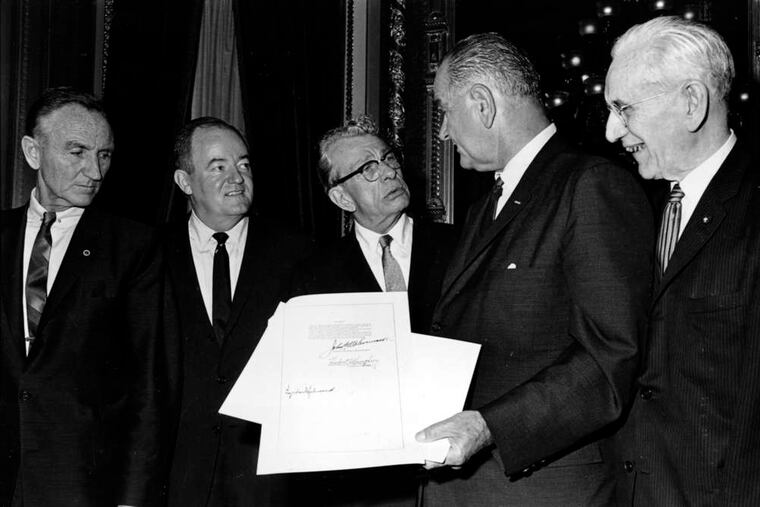Dr. King showed faith in government
Bruce Ackerman is the author of "We the People, Volume 3: The Civil Rights Revolution" The civil rights revolution of the 1960s was both a top-down and bottom-up affair.

Bruce Ackerman
is the author of "We the People, Volume 3: The Civil Rights Revolution"
The civil rights revolution of the 1960s was both a top-down and bottom-up affair.
The top-down story features President Lyndon Johnson joining with congressional Democrats and Republicans to hammer out the great Civil Rights and Voting Rights Acts, which have revolutionized American life. But the political energy for these collaborations was generated by the sit-ins and demonstrations of blacks and whites in the South and throughout the nation.
The Rev. Dr. Martin Luther King Jr. served as a bridge between Washington insiders and movement outsiders, providing examples of statesmanship that put our present-day political predicaments in historical perspective.
During the early 1960s, King's leadership was increasingly challenged by rivals who saw his interracial appeals for peaceful civil disobedience as a sell-out to a racist establishment. At the same time, Washington insiders looked upon King as a troublemaker.
President John F. Kennedy initially opposed the March on Washington, fearing that it would disrupt the fragile bipartisan negotiations essential for progress. Although Lyndon Johnson welcomed the movement's support in passing the Civil Rights Act of 1964, he was noncommittal when King asked him to make voting rights a high priority for 1965.
King responded to Johnson's evasions by throwing his support behind a voter-registration campaign in Selma, Ala. The result was violent confrontation between peaceful marchers and brutal police. As a shocked nation saw these terrible scenes on television news, Johnson decided that the time was ripe for decisive action.
When the Selma brutalities reached their climax on Bloody Sunday, the president proposed a breakthrough initiative in a special address to Congress. With 70 million television viewers looking on, he declared that "What happened in Selma is part of a far larger movement . . . [by] American Negroes to secure for themselves the full blessings of American life. Their cause must be our cause, too. Because it is not just Negroes, but really it's all of us who must overcome the crippling legacy of bigotry and injustice. And we shall overcome."
These last three words expressed a literal truth: Without the movement's determination to overcome Sheriff James Clark's brutality at Selma, Johnson might never have made his great speech. But once the president's voting-rights initiative hit Congress, King faced a very different kind of leadership challenge.
Southern die-hards mounted a Senate filibuster, requiring the liberal Democrats to make a deal with Minority Leader Everett Dirksen under which the Republicans would help break the filibuster in exchange for compromises that weakened some of the bill's sweeping initiatives. When the House passed a stronger version, the fate of the Voting Rights Act was up to a conference committee from both houses.
When they got together, House and Senate leaders quickly restored many of the stronger measures weakened by the Dirksen compromise. Yet they reached an impasse when it came to the notorious poll tax, which had barred poor Southerners from the polls for generations. After 10 days of hard bargaining, Attorney General Nicholas Katzenbach reached a complex compromise that satisfied Dirksen's objections and promised to end poll taxes in a year or two.
This was not soon enough for House liberals. They insisted on an immediate ban, even though their demand threatened to kill the entire bill. In desperation, Katzenbach turned to King. He was the only leader with the moral standing to compel House liberals to accept the deal with Dirksen.
King confronted a moment of truth. If he went along with the attorney general's request, he would once again be denounced as a sell-out by civil-rights militants. But if he refused, the campaign for a decisive voting-rights breakthrough might dissolve in a sea of political recrimination. King did not hesitate. He immediately came out in favor of the compromise.
King's endorsement overcame the purist opposition of the liberal House leadership, which passed the compromise into law. Moreover, as Katzenbach predicted, the poll tax was indeed swept away by the courts within a year.
Fifty years onward, King's actions provide historical perspective on the contemporary Washington scene - in which purist posturing has displaced commonsense negotiation as standard operating procedure. The resulting impasse on Capitol Hill is undermining the confidence of ordinary Americans in their system of government. Our democratic faith was put to a larger test last year when the Supreme Court struck down key elements of the Voting Rights Act, which originated in King's acts of statesmanship in 1965.
With both the court and Congress mocking the nation's achievements of the 1960s, this is a moment for national soul-searching: Is America really prepared to repudiate King's commitment to government by the people?
APPEARANCE
Bruce Ackerman and scholars Steven Calabresi and Tomiko Brown-Nagin will discuss how the landmark civil rights legislation of the 1960s changed constitutional law.
Wednesday, 6:30 p.m., at the Constitution Center.
Tickets start at $7.
Information: 215-409-6700 or visit constitutioncenter.org. EndText